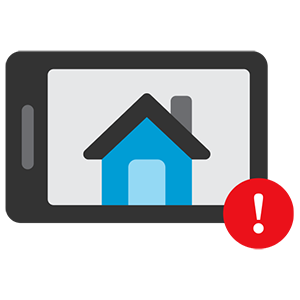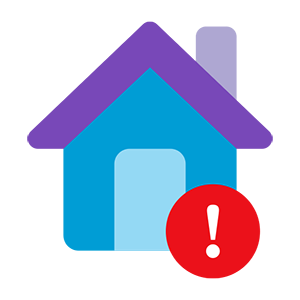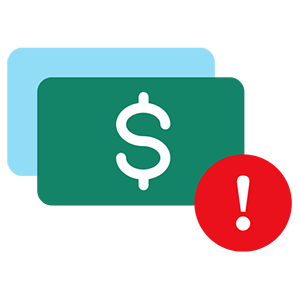Home sweet home? After long search online, you think you’ve finally found a new home or a new roommate! It might be a beautiful place with great amenities at a bargain price, or a roommate from abroad who can’t wait to come live with you. These are all exciting offers that sound too good to be true!
Maybe it is too good to be true. Scammers are hiding fraudulent rental ads amongst the legitimate and preying on roommate listings. They often lure the unsuspecting with overpromises to trick you out of your money and personal information.
So when it comes time to get a new place or find a new roommate to afford rent, how can you spot the scam amongst the real?
Whether you found the listing on a popular real estate app or on a marketplace platform, it could be hard to identify these fake ads at first glance. But there are different ways you can spot the scam:

- Rentals advertising below market prices but boasts great amenities. If the rental listing looks too good to be true, it usually is. Knowing the neighbourhoods going rental rate for similar listings will help you spot a rate that's too low for what it offers.

- Only exterior photos are shown, and interior photos are largely absent or reused from other listings. Anyone can take an image from the internet. You can also see if the photos have been used elsewhere with a Google Reverse Image Search by uploading an image or copying the URL of an image into the search box.1

- Address doesn't match the photos. If an address isn't listed, request it so you can verify in person or through online maps to ensure the pictures match. Search for the address online to see if the home was recently listed for sale or sold on a real estate site.

- Security deposit or rent payments requested upfront. The contact person should never request money right away to ‘hold your spot’ without doing a background check or having a formal rental agreement in place. Security deposits and rental payments should never be paid in cash, wire transfer or cryptocurrency.

- Requests for personal or banking details. The application process should require application fees and the first month's rent and last month's rent. However, a landlord doesn't need your banking information at any point, or any other personal or financial information when you inquire about a listing.

- A landlord who’s unwilling to meet you. Most scammers will offer excuses to avoid meeting you in-person or through a video or phone call. A genuine prospective landlord would take the time to choose the right tenant. Always schedule a face-to-face meeting and research the landlord, real estate agent or property manager that's listing the rental property. If it’s a new development, contact the developer.
In Canada, there's always a proper rental process that includes background checks, income verifications and formal paperwork. You can protect yourself by scheduling a visit with a landlord either in-person or through an online video call. If the listing seems legitimate, and you’re ready for the next step, review the rental agreements carefully before signing.
Roommate scams
Maybe you aren't looking for a new rental but instead want to find someone to help you split your existing rent, scammers like to prey on these listings too. Fake listings often target students who are looking for new roommates for the upcoming school year.
Roommate scams are a variation of a cheque overpayment scams. Scammers often pose as a prospective roommate who is out-of-town or from abroad. They’re eager to secure a spot before they arrive, so they will send you a bogus cheque or money order in an amount more than what you listed for. It may look something like this:
Someone responds to your ad and sends you a cheque for $10,000 instead of $1,000. They say it’s an accident and ask you to deposit the cheque but refund $9,000 back via cheque or wire transfer to rectify the mistake. Once cashed, the bank alerts you the cheque is fraudulent. By then, the scammers would have disappeared with $9,000 of your hard-earned money.
Here’s a few warning signs to look out for:
- They’re out of town, abroad, or caring for sick family member. Scammers will often provide excuses for why they cannot meet you in-person or speak with you over the phone or video, preferring to communicate via text or email.
- Renting without viewing. Scammers aren’t interested in seeing photos of the room or the living space. Someone who's legitimately interested in being your roommate will want to know more about the space and learn about who they’ll be living with. Schedule some time to meet and tour the space through video calls or better yet, in-person.
- Request for you to remove your posting. Scammers don't want you to realize you have options with a genuine renter.
- Eager to overpay. Don’t accept a cheque or money order for more than the amount requested. When it comes time to sign a roommate agreement, you can also confirm with your bank that the cheque or money order is real before depositing it in your account.
Choosing the right roommate is in your control. Trust your intuition, don’t let scammers rush you into a decision you are not ready to make.
When looking for a roommate, there are some best practices that you can employ:
- Don't provide any personal information in your ad. Only provide the location and rental amount. To make it easier to connect with interested renters, you can specify that you will only accept applications from locals or current residents of your province.
- Request the applicant’s full contact information, current employer and references. You should be able to verify the validity of a person based on their references and determine if they have a steady source of income by verifying their employment status. If the person is a student, you should check with their university to see if they're actually enrolled.
- Refuse online money transfer or cheques before signing a roommate agreement. An agreement or contract needs to be made to protect both you and any potential roommate. This is hard to establish if you're talking with someone you've never met in person.
What can you do if you've been scammed?
If you suspect you may have become involved in a rental or roommate scam, you need to act fast. Cut off all contact with the scammer and print out every correspondence you had with them. Inform local police about the incident and provide as much information as possible for them to investigate. You should also let your bank know of the situation so they can put a stop to any outstanding payments and monitor your account for fraud.
It is also essential to file a report with the Canadian Anti-Fraud Centre, which can be done confidentially through the online reporting system or by phone at 1-888-495-8501.


